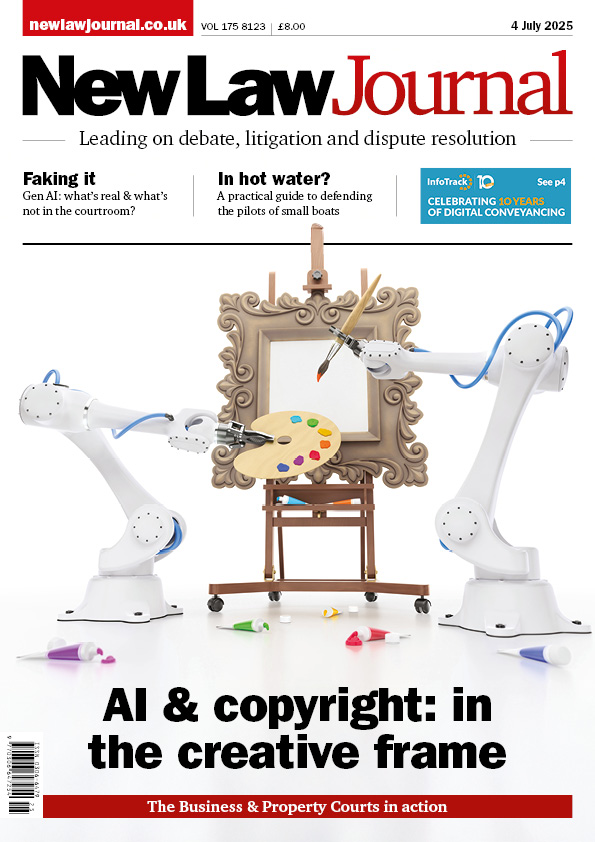THIS ISSUE

Aneurin Brewer sets out a practical guide to defending the pilots of small boats following the Nationality and Borders Act 2022
There is a growing threat of forged evidence in civil litigation—now supercharged by generative AI—which Ian Gascoigne of LexisNexis explores in this week’s NLJ
Writing in NLJ this week, Ben Travers of Foot Anstey examines the unresolved legal tensions at the heart of AI-generated content, following the high-profile Getty v Stability AI case. Although the primary copyright claim was dropped, Travers argues the core issues remain: can AI be trained on copyrighted material without permission, and who owns the output?
The volunteer judiciary has faced neglect. Tom Franklin explains why addressing this is important—for all parts of the legal system
Writing in NLJ this week, Elizabeth Rimmer of LawCare urges legal leaders to embed mental health into the core of organisational strategy
Could social media platforms be treated as ‘products’ under the Consumer Protection Act 1987? If so, they could face strict liability for harms caused by addictive design features and algorithmic manipulation, says Harry Lambert of Outer Temple Chambers, writing in NLJ this week
Kris Kilsby explains how to avoid third-party challenges under the Solicitors Act
In the second part of this series, Harry Lambert tackles some key questions: is social media a ‘product’ at all, and how might claims be brought against its platforms?
There is an urgent need to support England and Wales’s 14,000 volunteer magistrates, according to Tom Franklin of the Magistrates’ Association, writing in this week’s NLJ
Edward Blakeney and Ashpen Rajah of Falcon Chambers unpack the Court of Appeal’s decision in White v Alder [2025] EWCA Civ 392 in this week’s issue of NLJ. The ruling confirms that boundary demarcation agreements bind successors in title—regardless of whether they knew of the agreement when purchasing
MOVERS & SHAKERS

Freeths—Ruth Clare
National real estate team bolstered by partner hire in Manchester

Farrer & Co—Claire Gordon
Partner appointed head of family team

mfg Solicitors—Neil Harrison
Firm strengthens agriculture and rural affairs team with partner return
NEWS
Conveyancing lawyers have enjoyed a rapid win after campaigning against UK Finance’s decision to charge for access to the Mortgage Lenders’ Handbook
The Crown Prosecution Service (CPS) has launched a recruitment drive for talented early career and more senior barristers and solicitors
Regulators differed in the clarity and consistency of their post-Mazur advice and guidance, according to an interim report by the Legal Services Board (LSB)
The dangers of uncritical artificial intelligence (AI) use in legal practice are no longer hypothetical. In this week's NLJ, Dr Charanjit Singh of Holborn Chambers examines cases where lawyers relied on ‘hallucinated’ citations — entirely fictitious authorities generated by AI tools
The Solicitors Act 1974 may still underpin legal regulation, but its age is increasingly showing. Writing in NLJ this week, Victoria Morrison-Hughes of the Association of Costs Lawyers argues that the Act is ‘out of step with modern consumer law’ and actively deters fairness







